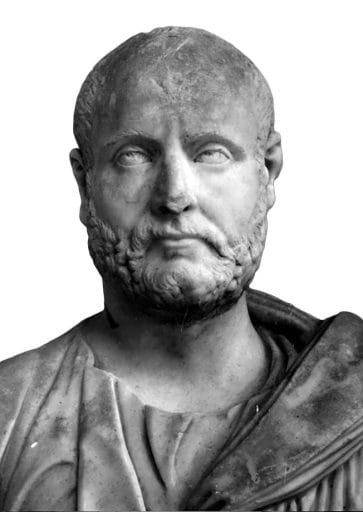Last Updated on May 18, 2023 by Vladimir Vulic
Life: AD c. 224 – 283

- Name: Marcus Aurelius Numerius Carus
- Born AD ca. 224 at Narbo in Gaul.
- Consul AD 283.
- Became emperor in September AD 282.
- Died near Ctesiphon, July/August AD 283.
Marcus Aurelius Numerius Carus was born around AD 224 in Narbo in Gaul.
Who was the Roman emperor Carus?
Carus was a Roman emperor who reigned from 282 to 283 CE. He was born around the mid-3rd century, and not much is known about his early life or origins. Carus is believed to have come from a senatorial family, and he rose to prominence during the reign of Emperor Probus.
He must have had an extensive and successful military career as in AD 276 emperor Probus made him praetorian prefect. But in AD 282 when he was inspecting troops in Raetia and Noricum in preparation for Probus’ campaign against the Persians, the discontent of the soldiers with their emperor boiled over and they hailed Carus the new ruler. Carus though is alleged to have rejected this offer at first out of loyalty to his emperor. If this is true or not, when Probus heard of the revolt he immediately sent forces to crush it. But the soldiers simply deserted and joined with those of Carus. Morale in Probus’ camp finally collapsed and the emperor was murdered by his own troops.
When Carus learnt of Probus’ death, he sent a messenger to inform the senate, that Probus was dead and that he had succeeded him. It says much about Carus that he didn’t seek the senate’s approval, as had always been the tradition. Far more he told the senators that he, Carus, was now emperor.
However, had Probus enjoyed respect among the senate, Carus though did think it wise to see to his predecessor’s deification.
Then Carus saw to establish his dynasty. He possessed two adult sons, Carinus and Numerian. Both were elevated to the rank of Caesar (junior emperor). But these elevations appear to have been arranged without Carus even visiting Rome.
News soon reached him that the Sarmatians and the Quadi had crossed the Danube and invaded Pannonia. Carus, together with his son Numerian, moved into Pannonia and there decisively defeated the barbarians, some reports telling of as many as sixteen thousand barbarian casualties, and twenty thousand prisoners taken.
In the winter of AD 282/3 Carus then set out for Persia, accompanied once again by his son Numerian, announcing that he sought to achieve the re-conquest of Mesopotamia planned by Probus.
The time seemed right, as the Persian king Bahram II was engaged in a civil war against his brother Homizd.
Also Persia had been in decline ever since the death of Sapor I (Shapur I). It was no longer represented a great threat to the Roman empire.
In AD 283 Carus invaded Mesopotamia unopposed, later defeated a Persian army and captured first Seleucia and then the Persian capital Ctesiphon itself. Mesopotamia was successfully reoccupied.
In celebration of this event the emperor’s elder son Carinus, who’d been left in charge of governing the west of the empire in Carus’ absence, was declared Augustus.
Carus Death
Next Carus planned to follow up his success against the Persians and drive yet further into their territory. But then Carus suddenly died. It was around the end of July and the emperor’s camp was close to Ctesiphon. Carus was simply found dead in his tent. There had been a thunderstorm and his death was explained by suggesting his tent had been struck by lightning. Punishment by the gods for seeking to push the empire beyond its rightful boundaries.
But this appears to be too convenient an answer. Other accounts tell of Carus dying of illness. With rumours pointing to Arrius Aper, the praetorian prefect and father-in-law of Numerian, who appeared to fancy the job of the emperor for himself, Carus might have been poisoned.
A further rumour hints at Diocletian, then the commander of the imperial bodyguard, being involved in the killing.
Carus had reigned for less than a year. Following his death, his son Numerian succeeded him as the emperor.
Carus’ reign was relatively brief, and his impact on Roman history is not as significant as some other emperors. Nevertheless, his military successes against the Sassanian Empire demonstrated his ability to lead and project Roman power beyond its borders. His death in the midst of the Persian campaign marked the end of his short-lived reign as Roman emperor.

Historian Franco Cavazzi dedicated hundreds of hours of his life to creating this website, roman-empire.net as a trove of educational material on this fascinating period of history. His work has been cited in a number of textbooks on the Roman Empire and mentioned on numerous publications such as the New York Times, PBS, The Guardian, and many more.
